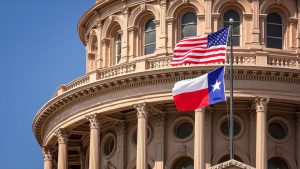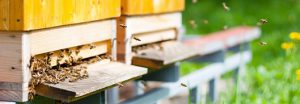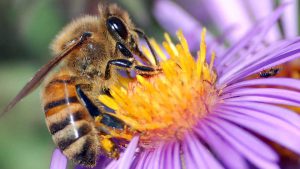Bee & Pollinator Bills
The Texas Legislature is considering a record number of bills that impact beekeepers and those concerned about bees & pollinators in our state.
Contact your State Representative and State Senator and let them know what you think about each of these bills! Elected officials want to hear from their constituents. If any of the bills are particularly important to you, ask to speak to the staffer who is handling that specific bill, and explain why you support or oppose the bill, or what changes you think are needed. Always be polite and treat your legislators and their staff as partners in the search for good policy solutions.
Summary of the Bills
- SB 677, as amended: Repeals the requirement of an intrastate permit and converts the current free apiary registration to a fee-based beekeeper registration, converts the import permit to a broad interstate transport permit, and exempts beehive removers from paying a fee for registration.
- HB 2670: Same as the amended SB 677, except that beehive removers would also pay the registration fee.
- HB 1723: Repeals the requirement of an intrastate permit.
- HB 4212: Establishes a licensing program for bee removers, including 160 hours of training.
- HB 2996: Excludes land in residential subdivisions from being qualified as agricultural land for property tax purposes.
- HB 136/ SB 2170: Forms a task force to study pollinator protection.
- HB 2483: Bans the use of neonic pesticides in public road right-of-ways.
- HB 2484: Creates a Bee Pollinator Task Force, comprised of state agency officials.
- SB 2691: Bans the use of neonic pesticides and glyphosate herbicides at school facilities.
- HB 2108: Expands the cottage food law in multiple ways, including allowing the sale of honey and honey-based products as a cottage food.
Details on Each Bill
Permitting & Beekeeper Registration Bills
SB 677 originally repealed the requirement for beekeepers to have a permit to transport bees across county lines within Texas (section 131.043, the “intrastate transport permit”). FARFA strongly supported the bill as filed.
At the committee hearing on March 11, a committee substitute was adopted which incorporated the substance of HB 2670, with one change. SB 677 now:
- Repeals the intrastate transport permit and repeals the export permit for moving bees out of Texas.
- Converts the import permit into a “interstate transport permit” that allows individuals to bring bees into Texas if they have an inspection in the state they are coming from or if they have had an inspection by the Texas apiary inspector anytime within the last 12 months.
- Expands the definition of “beekeeper” to cover anyone who “owns, leases, possesses, controls, or manages one or more colonies of bees for any personal or commercial purpose.”
- Creates beekeeper registration and empowers Texas Apiary Inspection Service to charge a fee for it.
Read SB 677 as amended and HB 2670. [UPDATED 4-5-2019: The hearing took place, and you can you can read FARFA Executive Director Judith McGeary’s testimony here.]
The most troubling provision in HB 2670/ SB 677 is the beekeeper registration. On the surface, it is voluntary. But some people must register their apiaries in order to qualify for ag valuation – and SB 677 transforms it from a free registration of the apiary into registration of the individual with a fee to be set by Texas Apiary Inspection Service (TAIS).
More troubling is that this provision lays the groundwork for mandatory registration of all beekeepers. Mandatory registration was proposed and pushed last session in HB 1293 by the same group that is now pushing this bill. Notably, the proposed definition of “beekeeper” in SB 677 / HB 2670 is the same as last session’s HB 1293, as are the substantive provisions for what is included in the registration, when it lapses, and the associated fees. Just one word would need to be changed to make it mandatory – and more than one witness on the amended SB 677 urged mandatory registration for all beekeepers.
This suspicion is fueled by the justification for this provision, namely that it is needed to help fund the TAIS to make up for the fees that will be lost by abolishing the intrastate permit. Yet abolishing the intrastate permit would have no fiscal impact because TAIS would also be relieved of spending the money to manage the intrastate permit program. So what are the registration fees needed for?
TAIS is unique among regulatory agencies in the lack of oversight – it is not subject to Sunset Review or any of the other normal mechanisms that provide transparency and accountability of agencies. Without some mechanism for holding the agency accountable, we oppose giving the agency authority to impose fees or specify what information beekeepers need to provide to register. (Currently, for apiary registration, the required information is specified in statute.)
Oddly, SB 677 exempts beekeepers doing beehive removals from the new fee for registration. Yet, along with the need for funding, the alleged reason for creating a fee-based registration was that, supposedly, abolishing the intrastate permit somehow makes it impossible for the TAIS to keep the list of beehive removers. If the registration is being proposed for the benefit of beehive removers, why are they the only ones who don’t pay for it?!
FARFA is also concerned by the illogical changes to the import permit. Under current law, an individual who brings bees into Texas must get an import permit and an inspection by the apiary inspector in the state that he/she is coming from. This is fairly standard for most major beekeeping states. Under SB 677/ HB 2670, the import permit is converted into an “interstate transport” permit, and the bees must either be inspected by the apiary inspector in the state they are coming from or have been inspected by the Texas apiary inspector anytime within the last 12 months.
This simply doesn’t make sense from a disease control standpoint. A 12-month-old inspection, after the hives have been moved through multiple states all over the country, is meaningless. When FARFA surveyed over 500 beekeepers last February, the majority of them wanted to see stricter requirements on importers; SB 677/ HB 2670 goes in the opposite direction. We have also heard from beekeepers who contend that there is no serious disease concern; if that is accurate, the whole permit should simply be abolished. A real analysis of the disease risks is needed – not creating a permit regime that still requires permits and fees, yet provides no real disease prevention mechanism.
Note that HB 1723 mirrors the original version of SB 677 and simply repeals the intrastate transport permit. FARFA supports HB 1723, so long as it remains as filed.
Beehive Remover Licensing
HB 4212 establishes a licensing regime for bee hive removers. The bill:
- Creates required training for bee removal work, which includes 80 hours of classroom training and 80 hours “practical” training.
- Creates an occupational license for bee removers.
- Requires bee removers to carry specific amounts of insurance.
While some regulation of bee removers may be appropriate, this bill goes much too far and is overly burdensome.
Property Taxes and Ag Valuation
HB 2996 excludes land in “residential subdivisions” from ag valuation under 1-d-1. This bill has broad implications for beekeepers as well as small farmers of all types, particularly the “market farmers” who already have significant trouble getting fair property tax treatment.
The bill sponsor is trying to address the problem of people with high-dollar properties who simply put a cow out on their land or some other token effort and get a major tax break. The underlying problem is the way the counties manage property tax assessments – granting ag valuation to such properties, while denying it to real working farms! Unfortunately, most working farmers can’t afford an attorney to challenge the county assessor, while the high-dollar property owners can … hence, the unequal treatment.
With respect to HB 2996, we are talking with the sponsor about how to balance the need to stop the abuse of ag valuation without penalizing legitimate farmers and beekeepers.
If the topic of ag valuation is important to you, please also check out the Fair Taxes for Small Farmers bill, HB 97! You can download our fact sheet on it, and read the text of the bill here.
Protecting Pollinators: Task Forces and Pesticide Restrictions
SB 2170/ HB 136 directs Agrilife to develop educational material for pesticide applicator training that includes the impacts of pesticides on bees and other pollinators. It also forms a task force with individuals drawn from government, academia, and advocacy organizations, to study the measures taken by other states for pollinator protection. The task force is also directed to study “best management practices” of one specific class of insecticides (neonicotinoid).
FARFA has approached the sponsor and recommended adding more beekeepers to the task force and studying best practices for all types of chemicals, including “tank mixes.”
HB 2484 creates a Pollinator Goals Task Force, drawn from state agency officials, to develop statewide bee pollinator goals and metrics and report on the state’s progress on a biennial basis.
HB 2483 would ban the use of neonics in the right-of-way of a public road or highway. The committee hearing on an identical bill last session was interesting. The opponents of the bill argued both (1) that the bill was unnecessary because neonics weren’t used in public right of ways, but (2) the government shouldn’t close that door. One witness, in a moment of candor, acknowledged that the opposition was because they didn’t want the precedent being set that any limits on neonics were appropriate.
SB 2061 would ban the use of both neonics and glyphosate in school buildings and facilities. Presumably, the nenonics are targeted because of their impacts on pollinators, while glyphosate was included because of the growing concerns about the human health impacts.
Honey Sales
HB 2108 would expand the cottage food law to open up new opportunities for home-based food producers. The current cottage food law allows individuals to make certain foods in their home kitchens (rather than a commercial kitchen) and sell them directly to consumers at specific locations, namely farmers’ markets, farm stands, and city, county, or nonprofit events. The foods are limited to specifically listed nonpotentially hazardous (NPH) foods; in other words, a food must be both NPH and listed in the statue in order to be made. The current cottage food law does not include honey or honey products.
Another law allows the sale of honey directly to consumers when processed in the beekeeper’s home kitchen, again limited to farmers’ markets, farm stands, and city, county, or nonprofit events. The small honey producers law is further limited to 2,500 lbs per year and has the additional restriction that the beekeeper or beekeepers family must personally be the one distributing the honey.
HB 2108 expands the cottage food law to covering all NPH foods – i.e. all foods that do not require time/temperature controls for food safety. This would encompass honey, honey spreads, and other honey-based products, as well as other low-risk foods that were left out of the current statutory list (such as roasted nut butters, energy bars, and more). Honey products would be subject to the existing Agriculture Code labeling requirements to prevent adulteration.
For all cottage food producers – which would now include people selling honey and honey-based products – HB 2108 would remove the location restrictions, allowing cottage food producers to sell to consumers at any location in the state so long as the transaction remained direct producer-to-consumer. Sales would continue to be capped at $50,000 of cottage food products per year. HB 2108 also expands the law to include items such as pickled, fermented, and frozen fruits and vegetables.
Read the full fact sheet on HB 2108 here.
TAKE ACTION
Our system of government works when people talk with their elected officials. Texas legislators will be considering literally thousands of bills over the next few weeks, on every topic imaginable. How can they know what matters to their constituents, unless those constituents contact them?
Check out our handout on why you should meet with your legislators, and then make the call!
Look up who your State Representative and State Senator are on the legislative website or call the Capitol Switchboard at 512-463-4630.
Call or email your State Representative and Senator to share your views with them. Briefly explain how the bills would impact you, and urge them to support their constituents’ interests.


